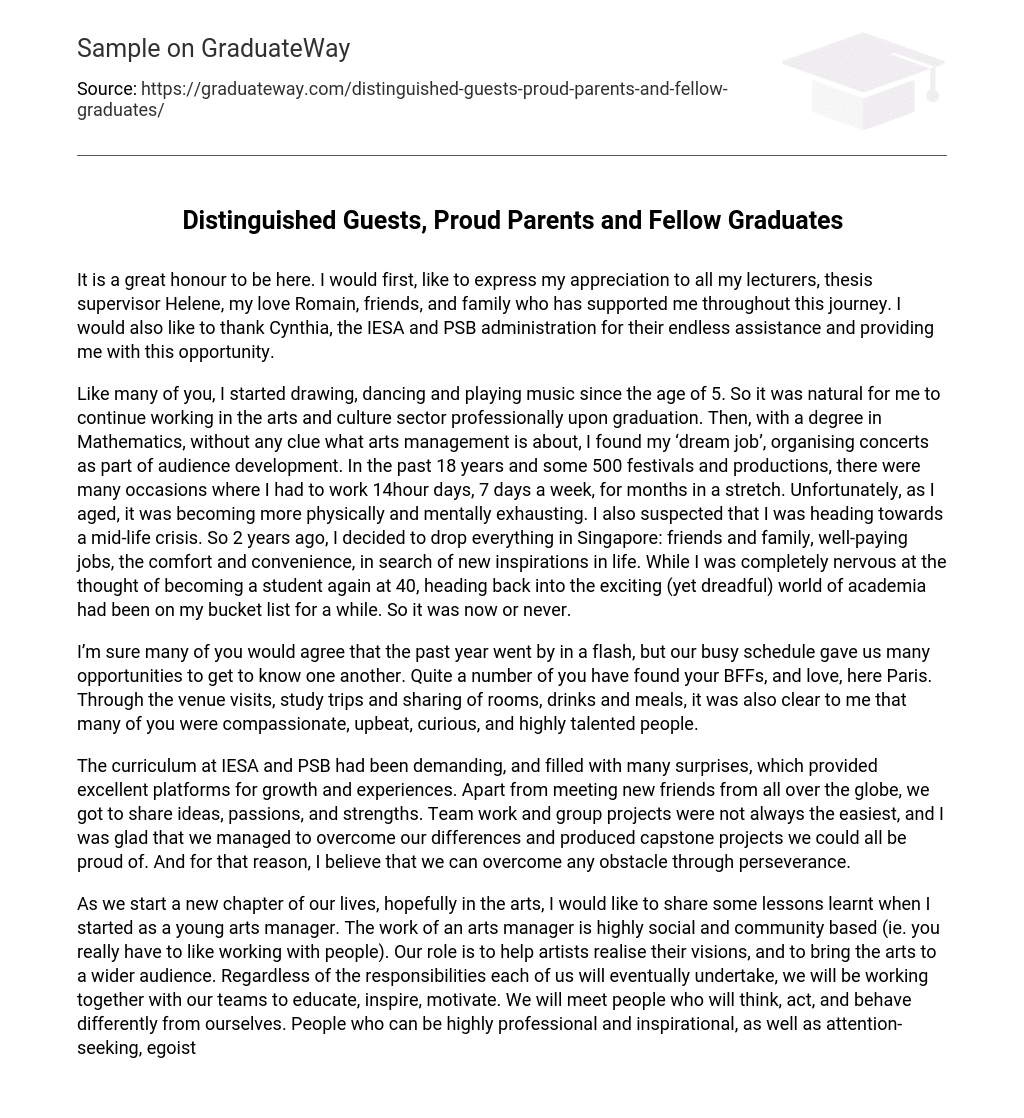It is a great honour to be here. I would first, like to express my appreciation to all my lecturers, thesis supervisor Helene, my love Romain, friends, and family who has supported me throughout this journey. I would also like to thank Cynthia, the IESA and PSB administration for their endless assistance and providing me with this opportunity.
Like many of you, I started drawing, dancing and playing music since the age of 5. So it was natural for me to continue working in the arts and culture sector professionally upon graduation. Then, with a degree in Mathematics, without any clue what arts management is about, I found my ‘dream job’, organising concerts as part of audience development. In the past 18 years and some 500 festivals and productions, there were many occasions where I had to work 14hour days, 7 days a week, for months in a stretch.
Unfortunately, as I aged, it was becoming more physically and mentally exhausting. I also suspected that I was heading towards a mid-life crisis. So 2 years ago, I decided to drop everything in Singapore: friends and family, well-paying jobs, the comfort and convenience, in search of new inspirations in life. While I was completely nervous at the thought of becoming a student again at 40, heading back into the exciting (yet dreadful) world of academia had been on my bucket list for a while. So it was now or never.
I’m sure many of you would agree that the past year went by in a flash, but our busy schedule gave us many opportunities to get to know one another. Quite a number of you have found your BFFs, and love, here Paris. Through the venue visits, study trips and sharing of rooms, drinks and meals, it was also clear to me that many of you were compassionate, upbeat, curious, and highly talented people.
The curriculum at IESA and PSB had been demanding, and filled with many surprises, which provided excellent platforms for growth and experiences. Apart from meeting new friends from all over the globe, we got to share ideas, passions, and strengths. Team work and group projects were not always the easiest, and I was glad that we managed to overcome our differences and produced capstone projects we could all be proud of. And for that reason, I believe that we can overcome any obstacle through perseverance.
As we start a new chapter of our lives, hopefully in the arts, I would like to share some lessons learnt when I started as a young arts manager. The work of an arts manager is highly social and community based (ie. you really have to like working with people). Our role is to help artists realise their visions, and to bring the arts to a wider audience.
Regardless of the responsibilities each of us will eventually undertake, we will be working together with our teams to educate, inspire, motivate. We will meet people who will think, act, and behave differently from ourselves. People who can be highly professional and inspirational, as well as attention-seeking, egoistic and difficult Divas. My suggestion is to focus on what motivates you to do what you do, and to pick your battles, then learn how to best manage those difficult people and conditions, to achieve a win-win situation.
The importance of teamwork and building community also means that maintaining good relationships with your co-workers and audience are key. As you establish your network, you will become more resourceful, and able to better employ the help you need. Expect to work hard at earning respect from everyone, but always be respectful to each team member, be it the Artistic Director, Curator, production crews, or front of house staff.
Try to understand everyone’s roles and empathise with their difficulties. Offer to help where you can. Be mindful of your choice of words and actions, people judge and often react the same way you do. (Here is a tip) Be especially nice to the Directors’ PAs, technical crews, security officers and cleaning ladies. They will be the most crucial support you may ever need. Always be thankful for any contributions, no matter how small.
For some of us, this may be the end of the academic journey. However, always be inquisitive and never stop learning. Go to exhibitions, watch as many productions as you can afford, learn to listen and communicate more effectively. Practice with Excel, Photoshop, Mailchimp, as they will be important skills to have.
Continue to improve your strengths and work on your weaknesses. New skills and abilities will help you to develop more creative solutions. Remind yourselves that every mistake made and negative experiences are great learning opportunities. Always strive to improve the way things work.
For those of you who are diving into the wonderful world of the arts and culture, the future will be challenging, frustrating, and at times demoralising. But I can assure you, that it will be the most rewarding and enriching journey you will ever experience.
I wish you all the best as we embark on exciting new adventures, and that you will find what motivates you, and apply what you have learnt in meaningful ways, to be successful in the journey of life.





